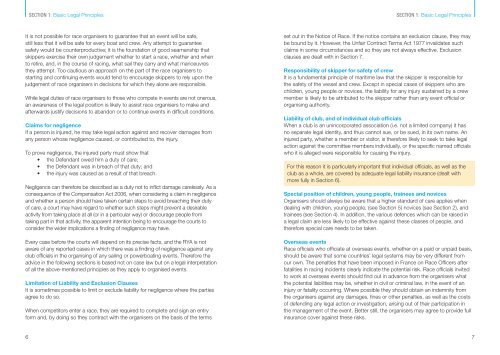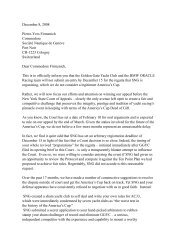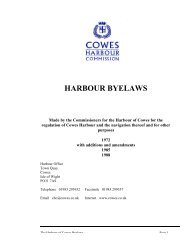The legal aspects of race, training and event management - rya
The legal aspects of race, training and event management - rya
The legal aspects of race, training and event management - rya
Create successful ePaper yourself
Turn your PDF publications into a flip-book with our unique Google optimized e-Paper software.
SECTION 1: Basic Legal PrinciplesSECTION 1: Basic Legal PrinciplesIt is not possible for <strong>race</strong> organisers to guarantee that an <strong>event</strong> will be safe,still less that it will be safe for every boat <strong>and</strong> crew. Any attempt to guaranteesafety would be counterproductive; it is the foundation <strong>of</strong> good seamanship thatskippers exercise their own judgement whether to start a <strong>race</strong>, whether <strong>and</strong> whento retire, <strong>and</strong>, in the course <strong>of</strong> racing, what sail they carry <strong>and</strong> what manoeuvresthey attempt. Too cautious an approach on the part <strong>of</strong> the <strong>race</strong> organisers tostarting <strong>and</strong> continuing <strong>event</strong>s would tend to encourage skippers to rely upon thejudgement <strong>of</strong> <strong>race</strong> organisers in decisions for which they alone are responsible.While <strong>legal</strong> duties <strong>of</strong> <strong>race</strong> organisers to those who compete in <strong>event</strong>s are not onerous,an awareness <strong>of</strong> the <strong>legal</strong> position is likely to assist <strong>race</strong> organisers to make <strong>and</strong>afterwards justify decisions to ab<strong>and</strong>on or to continue <strong>event</strong>s in diffi cult conditions.Claims for negligenceIf a person is injured, he may take <strong>legal</strong> action against <strong>and</strong> recover damages fromany person whose negligence caused, or contributed to, the injury.To prove negligence, the injured party must show that• the Defendant owed him a duty <strong>of</strong> care;• the Defendant was in breach <strong>of</strong> that duty; <strong>and</strong>• the injury was caused as a result <strong>of</strong> that breach.Negligence can therefore be described as a duty not to infl ict damage carelessly. As aconsequence <strong>of</strong> the Compensation Act 2006, when considering a claim in negligence<strong>and</strong> whether a person should have taken certain steps to avoid breaching their duty<strong>of</strong> care, a court may have regard to whether such steps might pr<strong>event</strong> a desirableactivity from taking place at all (or in a particular way) or discourage people fromtaking part in that activity, the apparent intention being to encourage the courts toconsider the wider implications a fi nding <strong>of</strong> negligence may have.Every case before the courts will depend on its precise facts, <strong>and</strong> the RYA is notaware <strong>of</strong> any reported cases in which there was a fi nding <strong>of</strong> negligence against anyclub <strong>of</strong>fi cials in the organising <strong>of</strong> any sailing or powerboating <strong>event</strong>s. <strong>The</strong>refore theadvice in the following sections is based not on case law but on a <strong>legal</strong> interpretation<strong>of</strong> all the above-mentioned principles as they apply to organised <strong>event</strong>s.Limitation <strong>of</strong> Liability <strong>and</strong> Exclusion ClausesIt is sometimes possible to limit or exclude liability for negligence where the partiesagree to do so.When competitors enter a <strong>race</strong>, they are required to complete <strong>and</strong> sign an entryform <strong>and</strong>, by doing so they contract with the organisers on the basis <strong>of</strong> the termsset out in the Notice <strong>of</strong> Race. If the notice contains an exclusion clause, they maybe bound by it. However, the Unfair Contract Terms Act 1977 invalidates suchclaims in some circumstances <strong>and</strong> so they are not always effective. Exclusionclauses are dealt with in Section 7.Responsibility <strong>of</strong> skipper for safety <strong>of</strong> crewIt is a fundamental principle <strong>of</strong> maritime law that the skipper is responsible forthe safety <strong>of</strong> the vessel <strong>and</strong> crew. Except in special cases <strong>of</strong> skippers who arechildren, young people or novices, the liability for any injury sustained by a crewmember is likely to be attributed to the skipper rather than any <strong>event</strong> <strong>of</strong>fi cial ororganising authority.Liability <strong>of</strong> club, <strong>and</strong> <strong>of</strong> individual club <strong>of</strong>ficialsWhen a club is an unincorporated association (i.e. not a limited company) it hasno separate <strong>legal</strong> identity, <strong>and</strong> thus cannot sue, or be sued, in its own name. Aninjured party, whether a member or visitor, is therefore likely to seek to take <strong>legal</strong>action against the committee members individually, or the specifi c named <strong>of</strong>fi cialswho it is alleged were responsible for causing the injury.For this reason it is particularly important that individual <strong>of</strong>fi cials, as well as theclub as a whole, are covered by adequate <strong>legal</strong> liability insurance (dealt withmore fully in Section 6).Special position <strong>of</strong> children, young people, trainees <strong>and</strong> novicesOrganisers should always be aware that a higher st<strong>and</strong>ard <strong>of</strong> care applies whendealing with children, young people, (see Section 5) novices (see Section 2), <strong>and</strong>trainees (see Section 4). In addition, the various defences which can be raised ina <strong>legal</strong> claim are less likely to be effective against these classes <strong>of</strong> people, <strong>and</strong>therefore special care needs to be taken.Overseas <strong>event</strong>sRace <strong>of</strong>fi cials who <strong>of</strong>fi ciate at overseas <strong>event</strong>s, whether on a paid or unpaid basis,should be aware that some countries’ <strong>legal</strong> systems may be very different fromour own. <strong>The</strong> penalties that have been imposed in France on Race Offi cers afterfatalities in racing incidents clearly indicate the potential risk. Race <strong>of</strong>fi cials invitedto work at overseas <strong>event</strong>s should fi nd out in advance from the organisers whatthe potential liabilities may be, whether in civil or criminal law, in the <strong>event</strong> <strong>of</strong> aninjury or fatality occurring. Where possible they should obtain an indemnity fromthe organisers against any damages, fi nes or other penalties, as well as the costs<strong>of</strong> defending any <strong>legal</strong> action or investigation, arising out <strong>of</strong> their participation inthe <strong>management</strong> <strong>of</strong> the <strong>event</strong>. Better still, the organisers may agree to provide fullinsurance cover against these risks.6 7







